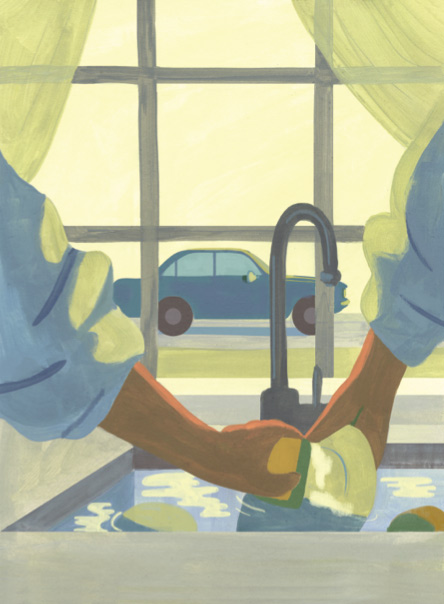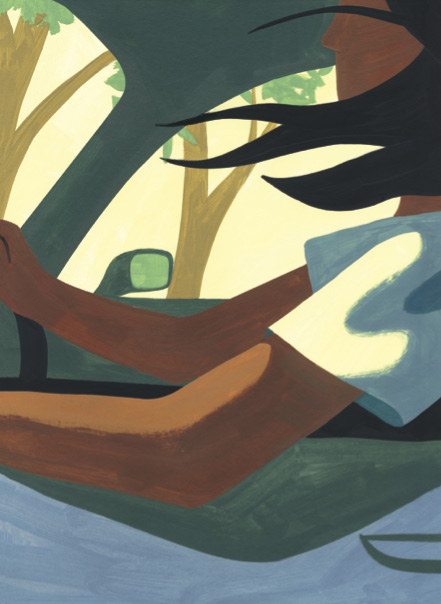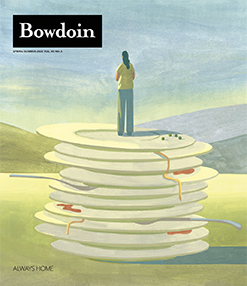Long Overdue
By Elise Juska ’95, excerpted for Bowdoin MagazineIn the spring of 2020, my twenty-fifth Bowdoin reunion was canceled. It was a minor disappointment against the backdrop of a world struggling under the weight of the pandemic, but I had looked forward to being back on campus and reconnecting with my classmates—and the twenty-fifth felt particularly significant. That May, in a not-so-subtle attempt at coping with isolation, I began writing a novel about three friends who, after the pandemic has subsided, attend their rescheduled reunion at a small college in Maine.
At first, writing Reunion was a way of conjuring places I was missing: Maine, a picturesque quad, the beautiful islands nearby. As the story kept unfolding for me, and the world began opening up, the idea of a reunion took on greater relevance and meaning. I was struck by the ways that returning to a college campus—like our collective return to the world—is revisiting a place that no longer exists in quite the same way, one that is both familiar and deeply changed. And I thought more about the phase of life marked by a twenty-fifth reunion and the way that milestones like it can spark introspection and be catalysts for change.
The opening scene takes place on the night before reunion weekend as Hope, a mom of two, reminds her husband that she’s going, “the weary slosh” of doing the dinner dishes a backdrop to their conversation. She’s eagerly anticipating a respite from the stresses of family life, a solo drive, and then two days away after many long months at home, and she’s willing to endure his irritation at the inconvenience to get it.

“I could have sworn you knew this was coming up,” Hope said, carrying a stack of dinner dishes to the kitchen sink.
“It’s right there.” She stopped to nod at the refrigerator, where beside the kids’ most recent school pictures, the calendar was turned to the month of June. “See?”
A year ago, a different calendar had hung in that same spot, a different month of June, the one that had vanished. The squares had remained filled with canceled graduation parties and end-of-year class picnics, day camps, and trips to the Jersey shore. Now, the boxes had filled up again, assuming their hopeful new shapes: Izzy’s eighth-grade dance, Rowan’s indoor karate classes. Ethan’s end-of-semester faculty reception. Reunion. One year later, a different event.
Ethan was still at the kitchen table, wearing the blue T-shirt, blue sweatpants, and bald leather slippers he changed into at the end of every workday online. “Reunion? What reunion?”
“My college reunion. My twenty-fifth—well, twenty-sixth, technically.”
“I thought that was canceled.”
“It was,” Hope said lightly. “That’s why it’s happening now.”
He tunneled his fingers through his hair and frowned, as if questioning her math.
“We talked about this,” Hope said, but kept her eyes on the dishes as she scraped the uneaten noodles into the garbage disposal. It was technically true. They had talked about it, back in April, when the email arrived in Hope’s inbox announcing her reunion had been rescheduled. Ethan had been sitting in that same spot, drinking coffee and reading something on his iPad, while Hope stood by the counter, waiting for Rowan’s waffles to finish toasting and scrolling on her phone. When she saw the invitation—A Celebration with Classmates, Long Overdue—she’d read it out loud to confirm that it was real.
“Kind of melodramatic, isn’t it?” Ethan had said.
“Is it?” Hope had replied. “Oh, I don’t think so. I think it’s kind of moving, actually.”
“On Zoom?”
“No, no. On campus.”
“So you’ll go?”
“Of course!” she’d said. “I mean, assuming people are going.” And then—what? Izzy had texted from her room that the wireless router needed to be reset again or Rowan had raced into the kitchen declaring he was starving or Ethan had evaporated into another meeting, and they hadn’t resumed the conversation, not then and not ever. Hope had written it on the calendar, but Ethan never noticed the calendar, much less consulted it for information. To him, it was purely decorative, as dated as a rotary phone. In the past year, he’d become even more reliant on technology, AirPods nestled in his ears and his bedside charging station drooling wires. His schedule existed solely in the cloud. Now he blinked at the calendar, as if waiting for a more reasonable explanation to present itself. Appropriately, it was the Walthrop one that the school sent Hope each year for donating to the alumni fund. The photo for the month of June showed the quad in early summer—classic redbrick dorms, flowering pink trees—and the squares beneath it were crowded with Hope’s handwritten notes and reminders. If Ethan ignored wall calendars, Hope relied on them, the ink-filled squares evidence of the fullness of their lives. She was a planner by nature; for her, the shapelessness of the past fifteen months, the inability to look forward, had been one of the hardest parts.
“And this is happening tomorrow?” Ethan said.
“Right.” Hope turned on the faucet, holding a finger under the tap until the water ran hot.
“I’m assuming I’m not going,” he said. “Or did you forget to mention that, too?”
“Oh—I figured you wouldn’t want to,” Hope said, knowing this was true. Ethan had gone to previous Walthrop reunions but never appeared to particularly enjoy them, and had never attended his own reunions, or even seemed to see the point. Maybe because he now worked in academia, he was no longer able to summon any nostalgia for his own alma mater, a tier-one university fifteen times the size of Hope’s cozy liberal arts college. His relationship to higher education had become largely managerial: a history professor turned dean of the Humanities Department, chair of the Academic Crisis Task Force last spring.
“But you’re taking the kids?” he said.
It was more a statement than a question, and the part of the conversation Hope had been dreading most.
“No, actually,” she said, doing her best to sound casual as she pulled open the dishwasher. “Just me.”
Ethan pinched one arm of his glasses, a square two-toned pair Izzy had chosen for him online, and resettled them on his face. “What?”
“I just thought it would be simpler.”
He gave a short laugh. “For whom?”
Hope had rehearsed her reasons. “It’s too big an event to bring them to,” she told him, rinsing a handful of forks. “Too much too soon. And your semester is officially over, right?”
This was all true, too. Though things seemed to be—finally, thankfully—getting back to normal, and the college was taking plenty of precautions, she could argue it was still safer to leave the kids at home. And in theory, Ethan now had some room in his schedule. The week before, he’d attended a modified version of commencement, addressing the graduates and their guests, who sat sprinkled across the football field.
“It is,” Ethan said. “But I was planning to get back to working on my book.”
Hope concentrated on slotting plates in the dishwasher, wanting to point out that Ethan was always working on his book. That Ethan was always working, period. As soon as the academic year wound down, there was the book, a history of global transportation, perpetually urgent and perpetually unfinished. Admittedly, in normal times, Hope didn’t mind that Ethan was so busy: he worked on campus and she stayed home. It was a lifestyle made possible by the generosity of her parents, who had quietly helped them out with down payments and private school tuitions and three years of fertility treatments. Of course, taking care of the kids and house was hard work, too (more so than Ethan ever seemed to realize), but Hope was aware of the perks that came with it: the moments of solitude on a weekday—a glass of pinot grigio, a midday TV show, an hour spent curled with a book in the sun—pockets of stolen peace and pleasure in exchange for keeping everything running. In the past year, of course, that alone time had disappeared.
The separate parts had all merged: work and home, Ethan’s life, her life. They’d never spent so much time together, not even when they were first dating, Hope prying Ethan away from his research for happy hour with her coworkers from the PR firm or takeout at her Center City apartment. Now Ethan was deeply around, yet deeply absent, most days spending fourteen hours in his office upstairs, emerging irritable and exhausted and leaving Hope to deal with everything else. So, as much as Hope wanted to take offense when he objected to her leaving for the weekend, the truth was that she had purposefully waited to tell him, afraid that to mention it sooner would complicate her plans.
“I’m sorry,” Hope said. “I really thought you knew about it.” She perched the wineglasses in the upper rack of the dishwasher. “But it should be an easy weekend. I already went to the store.” Not that she could remember the last time Ethan had shopped for groceries. Even last year, it was always Hope who braved Whole Foods, waiting in the carefully spaced-out line that wrapped around the parking lot before entering the building.
She’d made sure then to stock up on all of Rowan’s favorites, and for this weekend, she’d bought many of those same things—fruit snacks (bunny-shaped), chicken nuggets (dinosaur-shaped)—before swinging by Target for Lucky Charms (nuggets of processed sugar, but in desperate moments, they worked). For Izzy, whose help Hope knew she would rely on for the next few days, she’d picked up vegan ice cream and a case of coconut La Croix.
“I also made that taco casserole Rowan likes,” Hope continued, pouring detergent into the dishwasher. “It’s in the fridge. It just needs to be reheated.”
Ethan typed something into his phone, scratching at his beard. For their first fourteen years of marriage, he had always been clean-shaven, but in the past year he’d grown a thicket of bristles. “And when will you be back?” he asked without looking up.
“Sunday.”
“Yes, but when Sunday?”
“In the evening,” Hope said, quickly adding, “I didn’t want to fly.” Which, if not the complete truth, was certainly credible. The flight to Portland, Maine, was just ninety minutes, but Hope didn’t relish the thought of sitting elbow to elbow in a small, enclosed space.
Mostly, though, she liked the prospect of the solo drive—leaving early with her tumbler of coffee, cruising by the service plazas of New Jersey and the shimmering silhouette of New York City and on into New England, where the landscape would exhale, the sky widening and roadsides softening with trees.
“You’re driving?” Ethan said with the perplexed look of someone who had spent the past decade researching transportation and knew this was the least efficient option. “Why?”
“It’s not that far.” Hope shrugged. “I’m used to it.” She’d done the drive many times in college, first with her parents and later when she took her Jetta back and forth to school. “And Izzy will be here. She’ll help with Rowan.” Now that Ethan had been debriefed, Hope could let her daughter know about the reunion and ask her to pitch in. The dishwasher pinged, and she pressed the Start button and shut the door, heard the weary slosh of the wash cycle begin. “She just has that dance on Friday night—don’t worry, she’s getting a ride with Lacy—but other than that she’ll be around. I’m sure at some point you could sneak off to campus. The only thing you really need to remember is OT on Saturday morning.”
Ethan glanced up. “Online?”
“In person,” Hope replied, plucking the sponge off the sink. Ethan had not seen Rowan’s occupational therapist, in any format, since his initial evaluation, six weeks before the world shut down. The two of them had perched on child-sized chairs in a brightly colored playroom while Ellen, a kind, fit woman around Hope’s age—I’m a parent, too, she told them—spelled out what she’d observed about their son, the sensitivities and anxieties that, since then, had grown only more acute.
“I think it could be nice,” Hope continued, sweeping the sponge along the faucet. “You’ve been working so hard. And I know Rowan wants to spend time with you. It could be good for you to—”
“Please,” Ethan interrupted. “I don’t need you telling me what’s good for me.” He took his glasses off and slid them onto the table. “It’s exhausting.”
Hope stood still, sponge in hand, heartbeat ticking in her chest. Maybe it was because she’d be leaving soon for her reunion that for a moment she zoomed out and observed her husband at an objective distance, as she would a person she hadn’t seen in years. His hair was still more brown than gray, but noticeably thinning, and his hairline was receding. His eyelids looked heavy, probably from fatigue, and his glasses had left two shiny red dents on either side of his nose. But what struck her most was his expression: annoyed, impatient. She thought again about the beginning, when Ethan had seemed so grateful for her stepping in to organize his life, when his dedication to his work had reassured her.

She’d mapped out a plan for their future: a tenure-track position for him (East Coast, not too far from her parents), a wedding (August, at the Jersey shore), a baby (before age thirty-four). And for the first few years, it had happened just as she’d envisioned. She recalled her conversation with Polly—her college roommate, herself the mother of a five-year-old by then—when Hope decided to hold off on going back to work after having Izzy.
A stay-at-home mom? Polly had said. Is that as thankless as it sounds?
Then from upstairs, Rowan shouted: “Mom!”
Hope tipped her head toward the sound of his voice. “Yes, Ro?”
“I need you!”
She paused to note his tone, gauging the intensity of the issue: urgent, but probably not serious. He couldn’t find Gray Rabbit. His toothbrush tasted funny. His pajamas were inside out.
“It’s an emergency!”
“What’s the emergency, Ro?”
“I just need you,” he repeated, and, serious or not, Hope could tell from the tremble in his voice that things could escalate quickly.
She fought to sound airy and untroubled as she called back: “Be right there!” though she felt like bursting into tears. Then she returned the sponge to the sink and looked at her husband, and he looked at her, and for a moment Hope feared something would give way, the churning dishwasher might gape open and flood the room, but she only smiled.
“It’s just one weekend,” she said.
Elise Juska ’95 is a professor of creative writing whose previous novels include If We Had Known and The Blessings. Her new novel, from which this piece is excerpted, is Reunion, just published in May. She lives outside Philadelphia with her husband and son.
Holly Stapleton is an illustrator and painter based in Toronto. See more of her work at hollystapleton.ca.

This story first appeared in the Summer 2024 issue of Bowdoin Magazine. Manage your subscription and see other stories from the magazine on the Bowdoin Magazine website.